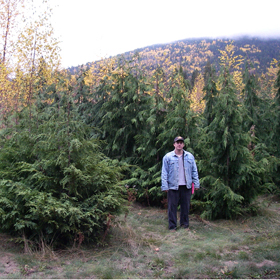Nicholas Ukrainetz

Nicholas Ukrainetz
Current Position
Forest Intern, Research Branch, British Columbia Ministry of Forests
Previous Position
Compassman, Summer Student Research Assistant
Education
BS (Forest Science) MS (Forestry)
Q & A
A general science background is essential, while a more detailed knowledge of forest genetics and ecosystems is a requirement. Students should focus on forestry topics relating to forest genetics, biology and ecology, as well as develop skills in statistical analysis, experimental design and technical writing. It also benefits to have good technical and field experience.
Currently, I am a forest intern, hired to fill the gaps anticipated in future retirements. With a little persistence, a career as one of BCs tree breeders is a definite possibility. Tree breeders are the people that organize the research that directs the tree improvement programs in British Columbia. Their efforts aim to improve tree growth, form and health to ensure quality forests for future generations.
Forestry was appealing because of the adventure and excitement of working outdoors in areas rarely seen by the general public. Working in the field of tree improvement is very fulfilling. The research done is applied to real-life problems and used to direct policy and make decisions about our forests. Working in this field, there is a great balance between office and field work, and physical and mental efforts.
Unfortunately, working in forestry requires people to move to forested areas, and if this is far from home, it could mean leaving family and friends.
The most exciting aspect of working in the forest research and tree improvement sector is the opportunity to see the results of research projects implemented and applied to problems in the forest industry, in particular, relating to seed transfer and tree improvement. Overcoming these obstacles with applied research is fulfilling and rewarding work.

